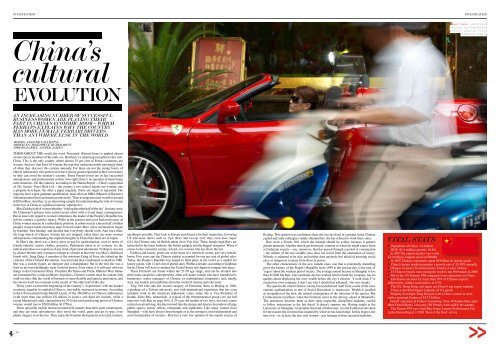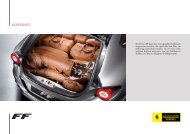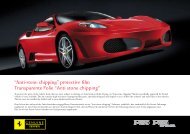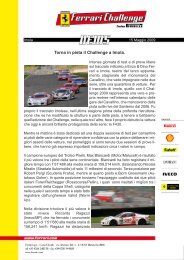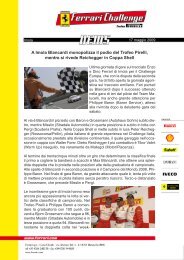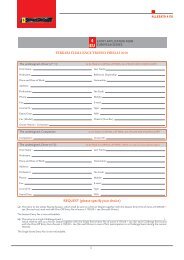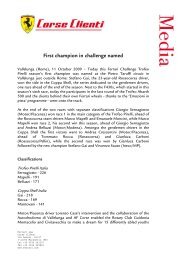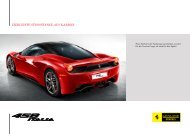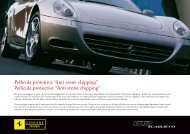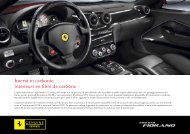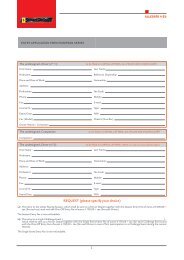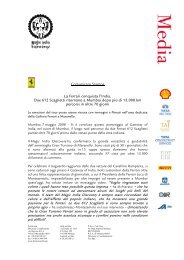Page 1 xx investigation investigation Throughout The world, the ...
Page 1 xx investigation investigation Throughout The world, the ...
Page 1 xx investigation investigation Throughout The world, the ...
Create successful ePaper yourself
Turn your PDF publications into a flip-book with our unique Google optimized e-Paper software.
<strong>investigation</strong><br />
China’s<br />
cultural<br />
evolution<br />
an inCreasing number of suCCessful<br />
businesswomen are playing <strong>the</strong>ir<br />
part in China’s eConomiC boom – whiCh<br />
perhaps explains why <strong>the</strong> Country<br />
has more female ferrari drivers<br />
than anywhere else in <strong>the</strong> <strong>world</strong><br />
words: federiCo rampini<br />
profiles: Josephine mCdermott<br />
photography: Jasper James<br />
ThroughouT <strong>The</strong> <strong>world</strong>, <strong>the</strong> word ‘Ferrarista’ (Ferrari-lover) is applied almost<br />
exclusively to members of <strong>the</strong> male sex. But <strong>the</strong>re’s a surprising exception to this rule:<br />
China. This is <strong>the</strong> only country where almost 25 per cent of Ferrari customers are<br />
women. And not ‘that kind’ of woman, <strong>the</strong> type that malicious minds unerringly think<br />
of when <strong>the</strong>y discover this curious anomaly. For <strong>the</strong>se are not <strong>the</strong> young lovers of<br />
elderly millionaires who prefer not to have luxury goods registered in <strong>the</strong>ir own names<br />
so <strong>the</strong>y can avoid <strong>the</strong> taxman’s scrutiny. <strong>The</strong>se Ferrari-lovers are in fact successful<br />
entrepreneurs and professionals in <strong>the</strong>ir own right; <strong>the</strong>re’s no question of <strong>the</strong>m being<br />
mere dummies. on <strong>the</strong> contrary, according to <strong>the</strong> hurun report – China’s equivalent<br />
of <strong>The</strong> Sunday Times Rich List – <strong>the</strong> country’s two richest figures are women; one<br />
a property developer, <strong>the</strong> o<strong>the</strong>r a paper magnate. Some are single or separated. <strong>The</strong><br />
majority have a post-graduate qualification, most often an MBA (Masters of Business<br />
Administration) from an American university. <strong>The</strong>ir average personal wealth is around<br />
€200 million. And <strong>the</strong>y’re an interesting sample for understanding <strong>the</strong> role of women<br />
in <strong>the</strong> rise of China as a global economic superpower.<br />
Mao Zedong said of women that <strong>the</strong>y ‘hold up <strong>the</strong> o<strong>the</strong>r half of <strong>the</strong> sky’. In many areas<br />
<strong>the</strong> Chairman’s policies were controversial, often with evil and tragic consequences.<br />
But at least with regard to women’s liberation, <strong>the</strong> leader of <strong>the</strong> People’s republic has<br />
left his country a positive legacy. While in <strong>the</strong> poorest and most backward areas of<br />
China women remain in a subordinate position, in urban society (almost half a billion<br />
people) women made enormous steps forward under Mao, when communism began<br />
by banning ‘foot binding’ and decreed that everybody should work. And since <strong>the</strong>n,<br />
<strong>the</strong> long march of Chinese women has not stopped; today <strong>the</strong>re are more women<br />
entrepreneurs commanding <strong>the</strong> capitalist heights in China than <strong>the</strong>re are in Japan.<br />
In Mao’s day <strong>the</strong>re was a heavy price to pay for egalitarianism, even in terms of<br />
female identity: unisex clo<strong>the</strong>s, greyness, Puritanism taken to its extreme via <strong>the</strong><br />
radical and obsessive rejection of any form of personal adornment. Perhaps it was not<br />
by chance that <strong>the</strong> only woman to emerge as a leader at that time was Mao’s diabolical<br />
fourth wife, Jiang Qing. A member of <strong>the</strong> notorious gang of Four, she stirred up <strong>the</strong><br />
violence of <strong>the</strong> Cultural revolution, was tried and <strong>the</strong>n condemned to death in 1980.<br />
She was a sinister figure, an intriguer and a manipulator, but in <strong>the</strong> end she was a<br />
loser in an overwhelmingly male <strong>world</strong> of power. even today it is still men who run<br />
things in <strong>the</strong> Communist Party. President Hu Jintao and Prime Minister Wen Jiabao<br />
are surrounded by a male politburo. In politics, Chinese women must be content with<br />
walk-on roles. But <strong>the</strong> <strong>world</strong> of business is more flexible and open to innovation, and<br />
has shown itself less resistant to <strong>the</strong> ascent of ‘<strong>the</strong> o<strong>the</strong>r half of <strong>the</strong> sky’.<br />
Thirty years on from <strong>the</strong> beginning of <strong>the</strong> country’s ‘experiment’ with <strong>the</strong> market<br />
economy, equality in capitalist China is, inevitably, measured in money. According<br />
to <strong>the</strong> US investment bank Merrill Lynch, of <strong>the</strong> 350,000 or so Chinese millionaires<br />
(with more than one million uS dollars in assets), one third are women, while a<br />
recent Mastercard study claimed that by 2015 <strong>the</strong> total purchasing power of Chinese<br />
women would rise to $260 billion (€175bn).<br />
<strong>The</strong>se upwardly mobile businesswomen feel smarter than <strong>the</strong>ir male counterparts,<br />
and <strong>the</strong>y are more adventurous: <strong>the</strong>y travel <strong>the</strong> <strong>world</strong>, party and go to spas; even<br />
plastic surgery is on <strong>the</strong> rise. <strong>The</strong>y enjoy <strong>the</strong> freedom <strong>the</strong>ir parents never did; to <strong>the</strong>m,<br />
<strong>xx</strong><br />
anything is possible. <strong>The</strong>y look to europe and America for <strong>the</strong>ir inspiration, favouring<br />
uS television shows such as Ugly Betty and Gossip Girl; <strong>the</strong>y even have Super<br />
Girl, <strong>the</strong> Chinese take on British talent show Pop Idol. <strong>The</strong>se female high-fliers are<br />
interested in <strong>the</strong> latest fashions, <strong>the</strong> hottest gadgets and <strong>the</strong> biggest designers. When it<br />
comes to <strong>the</strong> consumer society, at least, it is women who lay down <strong>the</strong> law.<br />
Fashion and luxury goods are at <strong>the</strong> heart of a relatively recent, and very female,<br />
boom. Five years ago <strong>the</strong> Chinese market accounted for one per cent of global sales.<br />
Today, <strong>the</strong> People’s republic has leaped to third place in <strong>the</strong> <strong>world</strong> as a market for<br />
luxury goods, with 12 per cent of global sales. Within a decade, according to goldman<br />
Sachs, China will have overtaken <strong>the</strong> United States and Japan to conquer first place.<br />
<strong>The</strong>se Ferraristi are found within <strong>the</strong> 27-50 age range, and can be divided into<br />
three main categories: entrepreneurs, often self-made women who have founded new<br />
businesses; senior managers of Chinese or multinational companies; and, finally,<br />
stars, top models and celebrities from <strong>the</strong> <strong>world</strong> of cinema and television.<br />
Ying Yeh falls into <strong>the</strong> second category of Ferrarista. Born in Beijing in 1948,<br />
a graduate of a Taiwan university, and with international experience that has even<br />
included work in <strong>the</strong> American diplomatic corps, today she is Vice-President of<br />
Kodak. echo ren, meanwhile, is typical of <strong>the</strong> entrepreneurial group (see our full<br />
interview with Ren on page 104). A 33-year-old mo<strong>the</strong>r of two boys, her early career<br />
centred on advertising; she later moved into <strong>the</strong> design and interior decoration of large<br />
public spaces: luxury offices, restaurants and nightclubs. Like many women from<br />
Shanghai – who have always been thought of as <strong>the</strong> strongest, most independent and<br />
most businesslike of women – ren has a very low opinion of <strong>the</strong> macho society of<br />
Beijing. This opinion was confirmed when she was involved in a project in <strong>the</strong> Chinese<br />
capital and male colleagues rudely shunned her; she has refused to work <strong>the</strong>re since.<br />
Ren owns a Ferrari 360, which she insisted should be yellow, because it garners<br />
greater attention. Ano<strong>the</strong>r stereotype destroyed: contrary to what one might expect from<br />
a Confucian society – one, moreover, that has passed through a period of communism<br />
– <strong>the</strong> culture of <strong>the</strong> new middle class does not recoil from <strong>the</strong> ostentation of luxury.<br />
Nobody is ashamed to be rich, and nei<strong>the</strong>r does anybody feel afraid of arousing social<br />
envy or dangerous scrutiny from those in power.<br />
<strong>The</strong> o<strong>the</strong>r characteristic of <strong>the</strong> new middle class, one that is potentially disturbing<br />
given <strong>the</strong> history of <strong>the</strong> People’s republic from 1949 to <strong>the</strong> present day, is <strong>the</strong> lack of<br />
‘regret’ about <strong>the</strong> weakest part of society. <strong>The</strong> average annual income in Shanghai is less<br />
than €3,000 but Ren, who maintains she has worked hard to build her company, has no<br />
qualms about displaying her own wealth before <strong>the</strong> city’s citizens. ‘I work hard, I’ve<br />
created my own company; I don’t see why I should feel ashamed,’ she says simply.<br />
<strong>The</strong> speed with which Chinese society has transformed itself from a state of <strong>the</strong> most<br />
extreme egalitarianism to one of Social Darwinism is impressive. Wealth is justified<br />
as recognition of <strong>the</strong> best, <strong>the</strong> natural consequence of <strong>the</strong> selection of <strong>the</strong> species. But<br />
Confucianism resurfaces when <strong>the</strong> Ferraristi enrol in <strong>the</strong> driving school at Maranello.<br />
<strong>The</strong> instructors describe <strong>the</strong>m as <strong>the</strong>ir most respectful, disciplined students, careful<br />
to follow instructions to <strong>the</strong> last detail. It doesn’t surprise me. Having taught at <strong>the</strong><br />
University of Shanghai, I remember this kind of behaviour: it is <strong>the</strong> Confucian devotion<br />
for <strong>the</strong> master, <strong>the</strong> reverent fear inspired by whoever has knowledge. In this respect, <strong>the</strong><br />
new rich – or, at least, <strong>the</strong> new rich women – pay homage to <strong>the</strong>ir ancestral tradition.<br />
<strong>investigation</strong><br />
Fast lane: Ambitious<br />
Chinese businesswomen<br />
proudly display <strong>the</strong>ir<br />
newfound wealth<br />
vital stats<br />
• Population of China: 1.3 billion<br />
• GDP: $3.4 trillion; growth: 10.8%<br />
• In 2007 <strong>the</strong> export market was worth<br />
$1.2 trillion; imports stood at $904bn<br />
• In 2007 Chinese consumers spent $8 billion on luxury goods<br />
• China’s luxury market maintains a growth rate of 20-30% annually<br />
• Chinese women’s favourite luxury brand is Louis Vuitton<br />
• 15 Chinese brands were among <strong>the</strong> <strong>world</strong>’s top 500 brands in 2008<br />
• 460 of <strong>the</strong> uS Fortune 500 companies have operations in China<br />
• Electronics account for more than 10% of Chinese exports,<br />
followed by clo<strong>the</strong>s and textiles, at 9.5%<br />
• <strong>The</strong> uS, hong Kong and Japan are China’s top export markets<br />
• China is <strong>the</strong> third largest importer of uS goods<br />
• Property developer Yang huiyan is <strong>the</strong> richest woman in Asia,<br />
with a personal fortune of $17.5 billion<br />
• Ferrari’s presence in China is increasing: it has 10 dealers <strong>the</strong>re, plus<br />
three Ferrari Stores. Last year, 180 Ferraris were sold in <strong>the</strong> country<br />
• <strong>The</strong> Ferrari 599 was voted Best Super Luxury Performance Car<br />
in <strong>the</strong> hurun report’s 2008 ‘Best of <strong>the</strong> Best’ survey<br />
>>
owners<br />
Bright lights, big<br />
city: Echo Ren with<br />
her Ferrari 360 on<br />
Shanghai’s Bund<br />
<strong>xx</strong><br />
Echo Ren, 33<br />
Job: Interior designer<br />
Drives: Ferrari 360<br />
owners<br />
‘I come from a rich family, much better off than<br />
o<strong>the</strong>rs,’ confides Echo Ren. ‘When I was growing up<br />
my mo<strong>the</strong>r had a restaurant and my fa<strong>the</strong>r ran a laundry<br />
factory. I’ve never experienced not having wealth.’<br />
Ren’s fa<strong>the</strong>r, now 60, still runs his business servicing<br />
Shanghai’s top hotels, including <strong>the</strong> Sheraton and<br />
Shangri-La. ‘It was more outstanding in my fa<strong>the</strong>r’s<br />
day to have wealth than it is today,’ she reflects.<br />
Ren, a mo<strong>the</strong>r of two, first got into business in<br />
her early twenties, designing advertising campaigns<br />
for many of China’s top 500 companies, including<br />
Nokia. She later set up her own advertising firm,<br />
acMedia. Her artistic abilities – she majored in design<br />
at Shanghai Artists’ Academy – <strong>the</strong>n led her to focus<br />
on interior design.<br />
As well as designing restaurant, bar and office<br />
interiors in Beijing, Shanghai and Hong Kong, she<br />
was also charged with sourcing <strong>the</strong> artwork when<br />
<strong>the</strong>med restaurant chain Rainforest Café launched in<br />
China five years ago. It was in <strong>the</strong> planning stages of<br />
<strong>the</strong> second café, in Beijing, that she experienced <strong>the</strong><br />
sexism she says some businesswomen in China have<br />
to face. ‘We had completed <strong>the</strong> café in Shanghai and<br />
<strong>the</strong>y were very happy with it, so I was asked to do <strong>the</strong><br />
one in Beijing,’ Ren explains. ‘I went to a meeting<br />
in Beijing and I was <strong>the</strong> only woman; <strong>the</strong>re were 20<br />
men. One of <strong>the</strong>m said to me, “You need to leave; we<br />
don’t want a woman here.” I left <strong>the</strong> room but inside<br />
I wanted to kill him. I haven’t done any business in<br />
Beijing since,’ she says, adding, ‘In north China it’s<br />
still difficult for women but it’s improving.’<br />
Is it any easier being a businesswoman in Shanghai?<br />
‘In Shanghai it’s very easy,’ Ren confirms. ‘Everyone<br />
works hard. Shanghai and Hong Kong women have<br />
a good reputation for business.’ She recently bought<br />
a wine bar which she is redesigning. ‘I don’t think of<br />
myself as particularly successful because <strong>the</strong>se days<br />
a lot of very young girls are more successful than<br />
me. But I enjoy my life. I never set out to make a lot<br />
of money but I always manage to come across good<br />
opportunities.’<br />
Ren sees her four cars – which sit on <strong>the</strong> driveway<br />
of <strong>the</strong> seven-bedroom Shanghai home she shares with<br />
her husband, who works in investment – as symbols of<br />
having worked hard. Her personalised yellow Ferrari<br />
360 is her pride and joy. Four years ago, seeing a<br />
woman driving a Ferrari in <strong>the</strong> city was a rare sight<br />
– even rarer that it was yellow. Ren admits she chose<br />
<strong>the</strong> colour because she wanted to stand out. ‘<strong>The</strong> car<br />
made me feel proud: people would stop to talk to me<br />
about [it],’ she recalls. ‘It was such a rare sight.’ It has<br />
even caught <strong>the</strong> eye of policemen who stop her to take<br />
pictures of <strong>the</strong> car. ‘I’m worried at first but <strong>the</strong>n realise<br />
<strong>the</strong>y just want to look at <strong>the</strong> car. In fact, if I ever make<br />
mistakes in it, I’ve found <strong>the</strong> police are more likely to<br />
let me off.’<br />
Driving <strong>the</strong> Ferrari makes Ren ‘feel proud, as if I am<br />
a very <strong>world</strong>ly person. It’s not like a piece of jewellery<br />
which can make you look cheap. It shows status.’ This<br />
year, she has clocked up 10,000km, and although she<br />
assures me she doesn’t drive it very fast, she admits<br />
her speed creeps up if she’s in a good mood.<br />
Ren’s o<strong>the</strong>r passion is collecting art. ‘If I find art<br />
I like, I buy it,’ she says simply. ‘Two months ago I<br />
went to Hong Kong to buy artwork from <strong>the</strong> Qing<br />
dynasty.’ A piece that no doubt takes similar pride of<br />
place as her Prancing Horse.<br />
>>
owners<br />
Yang Haibo, 37<br />
Job: Marketing director<br />
of an investment firm<br />
Drives: Ferrari F430<br />
DANCER YANg Haibo likens driving her beloved<br />
Ferrari F430 to <strong>the</strong> buzz she feels when she performs<br />
on stage. <strong>The</strong> 37-year-old handles <strong>the</strong> marketing for<br />
an investment company that she and her husband<br />
have run for 10 years. She divides her time between<br />
Beijing and Shanghai. Half <strong>the</strong> month she lives with<br />
her husband in <strong>the</strong>ir spacious, six-bedroom house in<br />
<strong>the</strong> Chinese capital; <strong>the</strong> o<strong>the</strong>r half, she stays in a 16thfloor<br />
apartment in Shanghai. For Haibo, <strong>the</strong> monthly<br />
business trip to Shanghai is all <strong>the</strong> better because she<br />
gets to drive <strong>the</strong> F430 that she took delivery of just<br />
three months ago. ‘I love coming back to Shanghai<br />
when I get to see <strong>the</strong> car,’ she confesses. ‘I’m excited<br />
every time I take it out.’<br />
Haibo’s Ferrari is very much her own indulgence.<br />
Her husband, who she says is ‘always concentrating<br />
on work’, has not yet even seen <strong>the</strong> car – he is based<br />
in Beijing. ‘He has his own driver and doesn’t like<br />
driving as much as me anyway,’ she notes.<br />
Haibo jumped straight in at <strong>the</strong> deep end with<br />
her F430, driving it at <strong>the</strong> Shanghai Ferrari Festival<br />
in April, following a pace car, just days after she<br />
bought it. ‘I did my top speed that day,’ she recalls,<br />
‘250km/h, going around <strong>the</strong> race circuit. It was so<br />
exciting.’ She already has her sights set on a Ferrari<br />
599 gTB Fiorano, though she loves her F430. ‘I think<br />
this model is just right for me because it’s not too big.<br />
It’s just right for a lady and I love <strong>the</strong> colour.’<br />
Haibo likens her passion for her Ferrari to her love<br />
of dance. At a young age she danced professionally,<br />
and now she practises ballet twice a week and<br />
ballroom dancing up to three times a week. She has<br />
a professional dance partner with whom she has<br />
performed for 10 years. Her achievements include<br />
performing with <strong>the</strong> acclaimed China National Song<br />
and Dance Ensemble. ‘Ballroom is a great passion<br />
of mine,’ she enthuses. ‘<strong>The</strong> samba is my favourite<br />
dance. Being on stage dancing is a bit like driving my<br />
Ferrari. It’s a similar buzz.’<br />
<strong>The</strong> dancer also has a penchant for shopping; each<br />
month she travels to Hong Kong to hit <strong>the</strong> malls, and<br />
says that her tiny size six frame means only designer<br />
clo<strong>the</strong>s fit her properly. ‘I’m so skinny I had to find a<br />
designer who makes <strong>the</strong> right size for me. Most of my<br />
clo<strong>the</strong>s are Cavalli.’<br />
Despite her privileged lifestyle, Haibo is by no<br />
means only money-driven. ‘For <strong>the</strong> future, I want more<br />
happiness,’ she confides, ‘not only from my business<br />
but in my life and for my family and friends.’<br />
<strong>xx</strong><br />
owners<br />
High flier: marketing<br />
director and dancer<br />
Yang Haibo in Mansion<br />
Hotel, Shanghai<br />
>>
owners<br />
Cai Driving Yang force: at <strong>the</strong> Cai wheel<br />
of Yang her behind Ferrari <strong>the</strong> F430: wheel<br />
a of potent her pride symbol and joy,<br />
of <strong>the</strong> a F430 radically Spider<br />
changing China<br />
<strong>xx</strong><br />
Cai Yang, 27<br />
Job: Shareholder in<br />
paper manufacturer<br />
Drives: Ferrari F430 Spider<br />
owners<br />
CAI YANg is not an average 27-year-old by any<br />
standard. She got her first car, a Lexus, at just 21; four<br />
years later she picked up <strong>the</strong> keys to a Mercedes. Now<br />
she can be seen turning heads in her Ferrari F430 Spider.<br />
A canny entrepreneur, her success is down to <strong>the</strong> fact<br />
that she started to dabble in business at <strong>the</strong> tender age<br />
of 17, right before China entered its greatest period of<br />
economic growth. ‘Our success is definitely because of<br />
China’s boom,’ she declares.<br />
Yang, toge<strong>the</strong>r with a small group of school friends,<br />
started what has become a money-spinning enterprise –<br />
exporting papyrus. Her husband, whom she married at 23<br />
and who is 11 years her senior, was also involved in <strong>the</strong><br />
small business at <strong>the</strong> time. When she finished her studies<br />
at <strong>the</strong> age of 20, she and her husband built <strong>the</strong> company<br />
up and made <strong>the</strong>ir fortune importing, manufacturing and<br />
exporting paper products. <strong>The</strong> company is now 10 years<br />
old and imports mainly from South Korea and Japan.<br />
‘Between 2000 and 2001 <strong>the</strong> business really took off,’<br />
Yang reflects. ‘In 2004 we experienced ano<strong>the</strong>r boost.<br />
I never expected it at all. I was just learning as I went<br />
along and upgrading <strong>the</strong> business.’<br />
Today, she and her husband are shareholders of <strong>the</strong><br />
firm Shanghai Packaging, and <strong>the</strong> majority of <strong>the</strong>ir<br />
business involves <strong>the</strong> manufacture of <strong>the</strong> silver paper that<br />
goes inside cigarette boxes. <strong>The</strong>y supply one of China’s<br />
biggest cigarette companies, Ningbo Cigarette Factory,<br />
which makes <strong>the</strong> popular brand Da Hong Ying (great<br />
Red Eagle). Smoking is a growth industry in China.<br />
Like most young professionals, Yang is out to have<br />
fun spending her money – and it doesn’t get much<br />
better than driving around <strong>the</strong> streets of Shanghai in <strong>the</strong><br />
early hours in a Ferrari F430 Spider. She first got into<br />
Ferraris when Shanghai was added to <strong>the</strong> Formula One<br />
calendar in 2004 with its brand new circuit. ‘I was a fan<br />
of Ferraris from <strong>the</strong>n, and afterwards got into <strong>the</strong> road<br />
cars,’ she says. She bought her Spider during Chinese<br />
New Year in February 2007. ‘I went for a Spider because<br />
I love convertible cars. It’s really fast and super-cool.<br />
Everyone looks at you when you drive it.’<br />
Yang is in an enviable position. ‘As I’m <strong>the</strong> boss I<br />
don’t have to show up early at <strong>the</strong> office so I get up<br />
late and <strong>the</strong>n go in,’ she reveals. ‘In <strong>the</strong> evening I have<br />
dinner with friends and family. If we are in <strong>the</strong> mood, we<br />
go out.’ She can often be found with friends in <strong>the</strong> VIP<br />
lounge of <strong>the</strong> ultra-modern Shanghai nightclub, Muse.<br />
Like many aspiring Shanghainese, <strong>the</strong> fun-loving<br />
businesswoman also has a fondness for designer brands.<br />
‘My favourite label is Dolce & gabbana. I also like Dior,’<br />
she confesses. ‘I love big handbags. I have about 10 or<br />
20 different designs at home – gucci, Chanel, Cavalli<br />
and Dolce & gabbana. Every two or three months I go to<br />
Hong Kong on a shopping trip. I usually spend <strong>the</strong> most<br />
on accessories and watches.’<br />
So what is left to achieve when you have done so<br />
much by <strong>the</strong> age of 27? ‘I would say I’m an ambitious<br />
person. I’m thinking about going abroad to Canada and<br />
North Korea as those countries have a lot of resources<br />
and many opportunities,’ she muses. ‘I’ll go <strong>the</strong>re and<br />
think about how we can expand <strong>the</strong> business.’<br />
Yang, however, remains modest about her early<br />
success. Asked if she is proud of her achievements, she<br />
simply says, ‘I’m satisfied.’<br />
>>
owners<br />
<strong>The</strong> magical<br />
combination of a<br />
beautiful woman, a<br />
beautiful Ferrari,<br />
and an enchanting<br />
Shanghai night<br />
<strong>xx</strong><br />
owners


